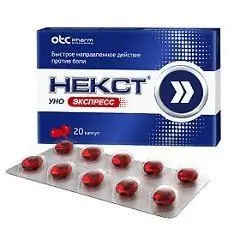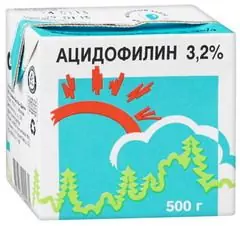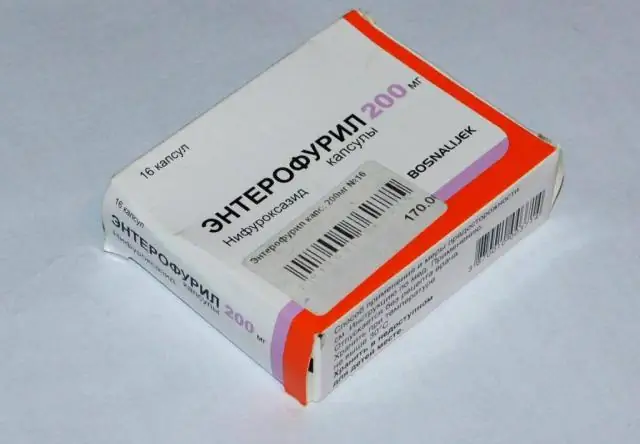Next Uno Express
Next Uno Express: instructions for use and reviews
- 1. Release form and composition
- 2. Pharmacological properties
- 3. Indications for use
- 4. Contraindications
- 5. Method of application and dosage
- 6. Side effects
- 7. Overdose
- 8. Special instructions
- 9. Application during pregnancy and lactation
- 10. Use in childhood
- 11. In case of impaired renal function
- 12. For violations of liver function
- 13. Use in the elderly
- 14. Drug interactions
- 15. Analogs
- 16. Terms and conditions of storage
- 17. Terms of dispensing from pharmacies
- 18. Reviews
- 19. Price in pharmacies
Latin name: Next Uno Express
ATX code: M01AE01
Active ingredient: ibuprofen (ibuprofen)
Manufacturer: Minskinterkaps, UP (Republic of Belarus)
Description and photo update: 28.11.2018
Prices in pharmacies: from 119 rubles.
Buy

Next Uno Express is a non-steroidal anti-inflammatory drug (NSAID).
Release form and composition
The drug is available in the form of capsules: gelatinous, red, oval, with a seam, transparent soft structure, inside the capsules - a transparent liquid with a pink tint or colorless (10 pcs. In blisters, in a cardboard box 1 or 2 packs and instructions for application of Neksta Uno Express).
1 capsule contains:
- active substance: ibuprofen - 200 mg;
- auxiliary components: alpha-tocopherol acetate, macrogol 600, povidone 17 PF;
- shell composition: gelatin, glycerol, methyl parahydroxybenzoate, non-crystallizing sorbitol solution, charming red dye (E129), purified water.
Pharmacological properties
Pharmacodynamics
The active substance in Neksta Uno Express - ibuprofen - is a derivative of propionic acid, NSAIDs with analgesic, anti-inflammatory and antipyretic effects. The fast targeted action of ibuprofen is due to its ability to inhibit the synthesis of prostaglandins (mediators of inflammation, pain and hyperthermic reaction) as a result of the indiscriminate blocking of cyclooxygenase 1 (COX-1) and cyclooxygenase 2 (COX-2). Ibuprofen inversely inhibits platelet aggregation.
Pharmacokinetics
After oral administration, the absorption of ibuprofen from the digestive tract is approximately 80%. The absorption of the drug is slightly reduced when the capsule is taken after a meal. When taken on an empty stomach, its maximum concentration (C max) in plasma is achieved after 3/4 hours, when taken after meals - after 1.5-2 hours, in synovial fluid - after 2-3 hours.
It binds to blood proteins (mostly albumin) by 90%.
Ibuprofen undergoes presystemic and post-systemic metabolism in the liver with the participation of the isoenzyme CYP2C9. About 60% of the pharmacologically inactive R-form of ibuprofen, after absorption, is slowly transformed into the active S-form.
The half-life (T 1/2) is 2–2.5 hours, has a two-phase elimination kinetics. It is excreted mainly through the kidneys (no more than 1% - unchanged), the rest - with bile.
Indications for use
The use of capsules Next Uno Express is indicated for the symptomatic treatment of headaches, migraines, neuralgia, back pain, muscle and rheumatic pains, toothaches, painful menstruation, fever with flu and colds in order to reduce pain and inflammation at the time of use.
The drug has no effect on the progression of the disease.
Contraindications
- a history of bleeding or perforation of a gastrointestinal ulcer caused by the use of NSAIDs;
- stage of exacerbation of gastric ulcer and duodenal ulcer, peptic ulcer, ulcerative colitis, Crohn's disease and other erosive and ulcerative pathologies of the gastrointestinal tract;
- active gastrointestinal bleeding;
- complete or incomplete combination of bronchial asthma, recurrent polyposis of the nose and paranasal sinuses and intolerance to NSAIDs or acetylsalicylic acid (including history);
- hemophilia, tendency to bleeding, prolonged bleeding time, hemorrhagic diathesis and other disorders of the blood coagulation system;
- intracranial hemorrhage;
- confirmed hyperkalemia;
- severe heart failure;
- condition after coronary artery bypass grafting;
- severe liver failure or active liver disease;
- severe renal failure with creatinine clearance (CC) less than 30 ml / min;
- progressive kidney disease;
- intolerance to fructose;
- age up to 12 years;
- III trimester of pregnancy;
- breast-feeding;
- hypersensitivity to the components in Neksta Uno Express.
It is recommended to prescribe the drug with caution in case of gastric ulcer and duodenal ulcer (in history), colitis, gastritis, enteritis, liver cirrhosis with portal hypertension, hepatic porphyria, hyperbilirubinemia, hepatic failure, chronic renal failure (CC 30-60 ml / min), nephrotic syndrome, renal failure, arterial hypertension, chronic heart failure, ischemic heart disease, cerebrovascular diseases, blood coagulation disorders, blood diseases of unknown etiology (anemia, leukopenia), diabetes mellitus, dyslipidemia or hyperlipidemia, peripheral arterial disease, Helicobacter pylori infection smoking, frequent alcohol consumption, autoimmune diseases of the connective tissue (including systemic lupus erythematosus),severe somatic diseases, pregnancy (I and II trimesters), in old age.
In addition, caution should be exercised with prolonged use of NSAIDs, concomitant use of prednisolone and other oral glucocorticosteroids (GCS), anticoagulants (including warfarin), antiplatelet agents (including clopidogrel), selective serotonin reuptake inhibitors (including paroxetine, citalopram, sertralinetine).
Next Uno Express, instructions for use: method and dosage
Capsules Next Uno Express are taken orally, after a meal, swallowed whole and washed down with one glass of water.
The dose and the period of admission are prescribed by the doctor, taking into account clinical indications.
Next Uno Express is recommended to be taken in the minimum effective dose for the shortest possible period necessary to eliminate symptoms.
Recommended dosage: 1 pc. 3-4 times a day with an interval of at least 4 hours. If it is necessary to quickly achieve a therapeutic effect, a single dose in adults can be increased to 2 pcs. and take 3 times a day. After achieving the desired clinical effect, the patient must be transferred to the usual dosage regimen.
The maximum daily dose of Neksta Uno Express for patients aged 12–18 years is 4 pcs., For adults - 6 pcs.
Taking the capsules should be discontinued and a doctor should be consulted if the fever after 3 days and the pain syndrome persist or worsen after 5 days of therapy.
Side effects
The use of Neksta Uno Express for 2-3 days practically does not cause the development of side effects.
With prolonged use of capsules, the risk of the following undesirable effects increases:
- from the nervous system: headache, drowsiness, dizziness, nervousness and irritability, insomnia, anxiety, confusion, psychomotor agitation, depression, hallucinations, rarely - aseptic meningitis (more often against the background of autoimmune pathologies);
- from the digestive system: indigestion, irritation, dryness of the oral mucosa, pain in the mouth, loss of appetite, nausea, vomiting, constipation, ulceration of the gingival mucosa, aphthous stomatitis, NSAID gastropathy (heartburn, abdominal pain, flatulence, diarrhea, pain and discomfort in the epigastric region), pancreatitis, ulceration of the mucous membrane of the gastrointestinal tract (including perforation and bleeding), hepatitis;
- on the part of the cardiovascular system: increased blood pressure (BP), tachycardia, worsening or development of heart failure;
- from the respiratory system: bronchospasm, shortness of breath, exacerbation of bronchial asthma;
- on the part of the hematopoietic organs: thrombocytopenia, agranulocytosis, leukopenia, thrombocytopenic purpura, hemolytic anemia, pancytopenia, aplastic anemia;
- from the hearing organs: noise or ringing in the ears, hearing impairment;
- on the part of the organs of vision: dryness and irritation of the eyes, reversible toxic amblyopia, double vision or blurred vision, edema of the allergic genesis of the conjunctiva and eyelids, scotoma, impaired color vision;
- from the urinary system: allergic nephritis, cystitis, nephrotic syndrome (edema), acute renal failure, polyuria;
- from the immune system: pruritus, erythematous skin rash, urticaria, allergic rhinitis, Quincke's edema, bronchospasm, fever, anaphylactoid reactions, anaphylactic shock, erythema multiforme exudative (including Stevens-Johnson syndrome), eosinophilia syndrome, non-toxic;
- laboratory indicators: possibly - an increase in the bleeding period, a decrease in the level of glucose concentration in the serum, a decrease in creatinine clearance, an increase in serum creatinine concentration, a decrease in hemoglobin or hematocrit, an increase in the activity of "hepatic" transaminases;
- others: increased sweating.
Overdose
Symptoms: nausea, vomiting, abdominal pain, lethargy, headache, drowsiness, tinnitus, depression, acute renal failure, metabolic acidosis, tachycardia, lowering blood pressure, bradycardia, atrial fibrillation, coma, respiratory arrest.
Treatment: within an hour after taking a high dose of Neksta Uno Express - gastric lavage or artificial vomiting; taking activated carbon, alkaline drinking, prescribing symptomatic therapy, forced diuresis. Careful monitoring of the patient's condition is necessary.
special instructions
During the period of taking ibuprofen, it is necessary to monitor the peripheral blood picture, the state of liver and kidney function.
The use of Neksta Uno Express in patients with systemic lupus erythematosus or other autoimmune diseases of the connective tissue is associated with an increased risk of developing aseptic meningitis.
With long-term treatment with high doses of ibuprofen, the likelihood of ulceration of the gastrointestinal tract mucosa, visual impairment (scotoma, color perception disorders, amblyopia), gingival, uterine, gastrointestinal and / or hemorrhoidal bleeding increases.
While taking NSAIDs in patients with a history of heart failure and / or hypertension, fluid retention, edema and arterial hypertension may appear. Therefore, it is not recommended for this category of patients to start therapy without consulting a specialist, they should be especially careful.
If symptoms of adverse events appear, you should stop taking Neksta Uno Express and consult a doctor.
Close monitoring is shown (including esophagogastroduodenoscopy, determination of hemoglobin and hematocrit in the blood, analysis of occult blood in the feces) when signs of gastropathy appear.
It should be borne in mind that the combination of ibuprofen with misoprostol or other prostaglandin E drugs helps to prevent the development of NSAID gastropathy.
During the period of treatment with the drug, the use of alcohol or the intake of ethanol-containing agents is contraindicated.
Long-term use of Neksta Uno Express increases the risk of acute coronary disease or stroke.
With bronchial asthma or a history of allergic diseases while taking ibuprofen, an asthma attack or bronchospasm may develop.
With concomitant therapy with anticoagulants and blood clotting disorders, it should be borne in mind that ibuprofen has a slight antiplatelet effect.
Next Uno Express can interfere with ovulation and cause reversible impairment of female reproductive function.
Ibuprofen can distort the results of the analysis for the determination of 17-ketosteroids, therefore it is recommended to stop taking the drug 48 hours before the start of the study.
Influence on the ability to drive vehicles and complex mechanisms
During the period of treatment, it is contraindicated to engage in potentially hazardous activities, the implementation of which requires increased attention and high speed of psychomotor reactions, including driving.
Application during pregnancy and lactation
The action of ibuprofen inhibits the contraction of the muscles of the uterus and negatively affects the fetus, causing premature closure of the Botallov's duct, which may result in the development of pulmonary hypertension in the newborn. Therefore, the use of Neksta Uno Express in the III trimester of the gestation period is contraindicated.
With caution, only in cases of acute need can ibuprofen be used in the first and second trimesters of pregnancy, if, in the opinion of the doctor, the expected therapeutic effect for the mother exceeds the potential threat to the fetus and child.
The use of Neksta Uno Express during breastfeeding is contraindicated.
Pediatric use
The appointment of Neksta Uno Express for the treatment of patients under the age of 12 is contraindicated.
Recommended dosage for patients aged 12-18 years: 1 capsule 3-4 times a day with an interval of at least 4 hours. The maximum daily dose is 4 capsules.
With impaired renal function
The appointment of ibuprofen is contraindicated in patients with severe renal insufficiency (CC less than 30 ml / min), progressive kidney disease.
With caution, capsules should be taken in case of renal failure, chronic renal failure (CC 30-60 ml / min), nephrotic syndrome.
For violations of liver function
The appointment of Neksta Uno Express is contraindicated in case of active liver disease, severe liver failure.
It is recommended to take the drug with caution in patients with hepatic insufficiency, hepatic porphyria, hyperbilirubinemia, liver cirrhosis with portal hypertension.
Use in the elderly
Care should be taken when prescribing Neksta Uno Express to elderly patients.
Drug interactions
With the simultaneous use of Neksta Uno Express:
- rifampicin, phenylbutazone, phenytoin, barbiturates, tricyclic antidepressants, ethanol (inducers of microsomal oxidation): increase the risk of developing severe hepatotoxic reactions against the background of an increase in the production of active hydroxylated metabolites of ibuprofen;
- inhibitors of microsomal oxidation: reduce the risk of hepatotoxic effect of the drug;
- antacids, cholestyramine: reduce the absorption of ibuprofen;
- caffeine: enhances the analgesic effect of the active substance;
- myelotoxic drugs: cause an increase in the hematotoxic manifestations of the drug;
- gold preparations, cyclosporine: increase the nephrotoxicity of ibuprofen, increasing its effect on the synthesis of prostaglandins in the kidneys;
- zidovudine: an increase in hematological toxicity is possible;
- quinolone antibiotics: may increase the risk of seizures;
- tacrolimus: increases the likelihood of developing nephrotoxicity;
- drugs that block tubular secretion: help to reduce the excretion of ibuprofen and increase its plasma concentration;
- cefamandol, cefotetan, cefoperazone, valproic acid: have an effect on the increase in the incidence of hypoprothrombinemia;
- antihypertensive drugs (including angiotensin-converting enzyme inhibitors, blockers of "slow" calcium channels): reduce their antihypertensive effect;
- furosemide, hydrochlorothiazide: there is a decrease in their natriuretic and diuretic activity;
- uricosuric drugs: reduce their effectiveness;
- glucocorticosteroids, colchicine, ethanol: under the influence of ibuprofen, they increase the ulcerogenic effect;
- oral hypoglycemic agents, insulin: enhance their therapeutic effect;
- digoxin, lithium and methotrexate preparations: their concentration in the blood increases;
- estrogens: ibuprofen increases the unwanted effects of estrogens;
- acetylsalicylic acid: there is a decrease in the anti-inflammatory effect of acetylsalicylic acid. When taking low doses of acetylsalicylic acid as an antiplatelet agent, its antiplatelet effect decreases while taking ibuprofen, which increases the risk of developing acute coronary insufficiency;
- anticoagulants, thrombolytics (alteplase, urokinase, streptokinase): the risk of bleeding increases;
- cyclosporine: increases the plasma concentration of cyclosporine and the risk of its hepatotoxic effects;
- mifepristone: ibuprofen reduces the therapeutic efficacy of mifepristone; therefore, it is possible to start taking ibuprofen only 8–12 days after discontinuation of mifepristone;
- zidovudine: HIV-positive patients with hemophilia significantly increase the risk of hematomas and hemarthrosis.
Analogs
Analogs of Neksta Uno Express are: Ibuprofen Sandoz, Ibuprofen-Akrikhin, MIG 400, MIG for children, Maxicold for children, Nebolin, Nurofen, Solpaflex, Sedalgin SPRINT, Faspik, Pedea, Advil, Bonifen, Brufen SR, Deblok.
Terms and conditions of storage
Keep out of the reach of children.
Store at temperatures up to 25 ° C in a dark place.
Shelf life is 2 years.
Terms of dispensing from pharmacies
Available without a prescription.
Reviews about Next Uno Express
Reviews about Next Uno Express are positive. Patients point to the rapid action of the drug, its effectiveness in symptomatic therapy of pain syndrome.
The presence of a risk of developing a number of adverse events is noted with prolonged use of Neksta Uno Express.
Price for Next Uno Express in pharmacies
The price of Next Uno Express for a package containing 10 capsules can be from 139 rubles, 20 capsules - from 273 rubles.
Next Uno Express: prices in online pharmacies
|
Drug name Price Pharmacy |
|
Next Uno Express 200 mg capsules 10 pcs. 119 RUB Buy |
|
Next Uno Express 200 mg capsules 20 pcs. 147 RUB Buy |

Maria Kulkes Medical journalist About the author
Education: First Moscow State Medical University named after I. M. Sechenov, specialty "General Medicine".
Information about the drug is generalized, provided for informational purposes only and does not replace the official instructions. Self-medication is hazardous to health!







